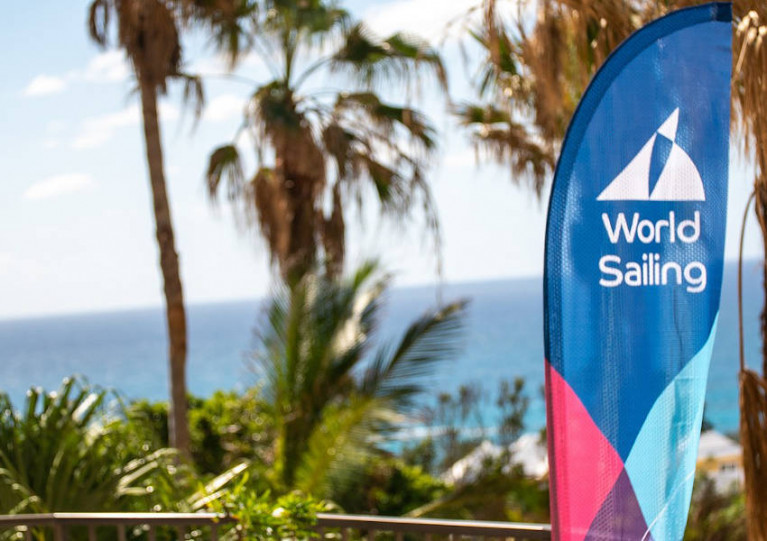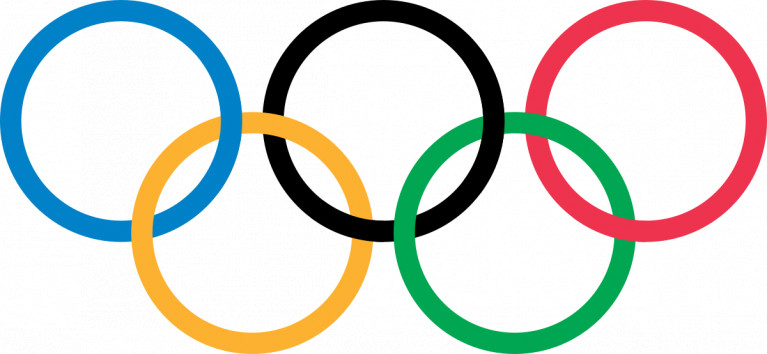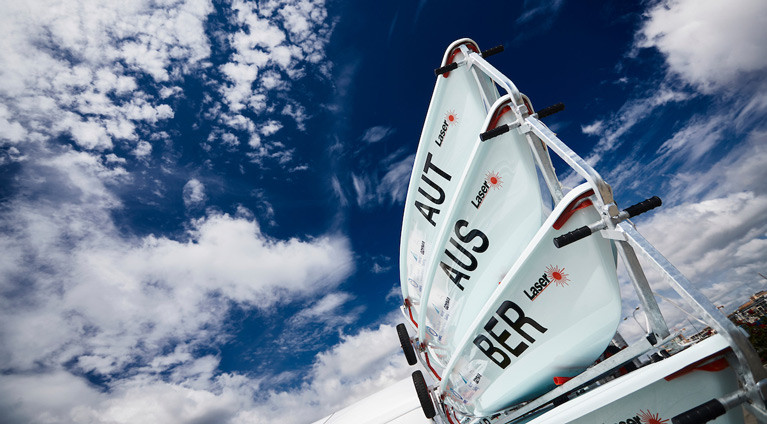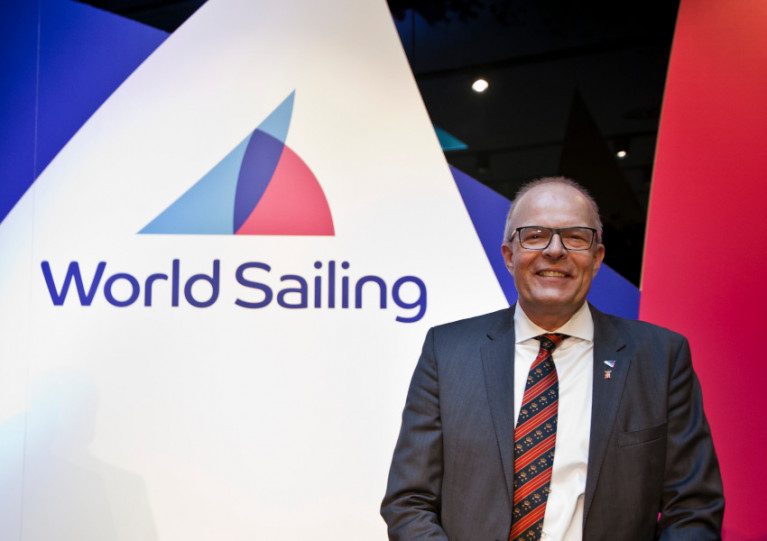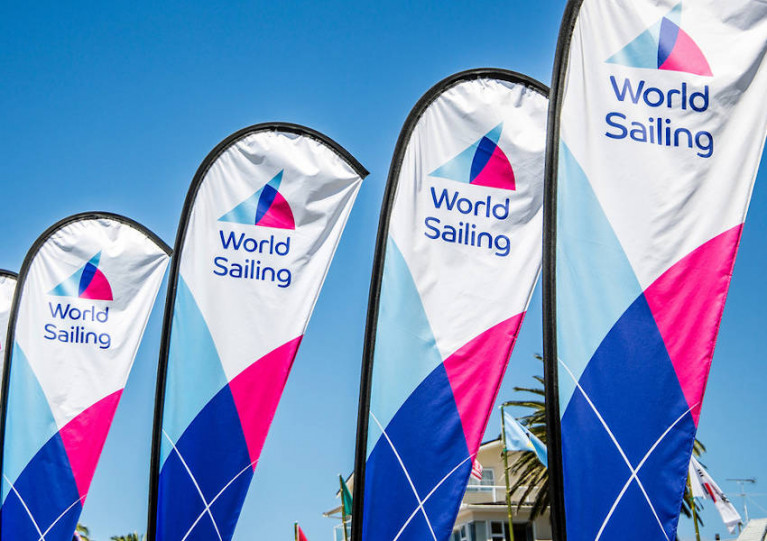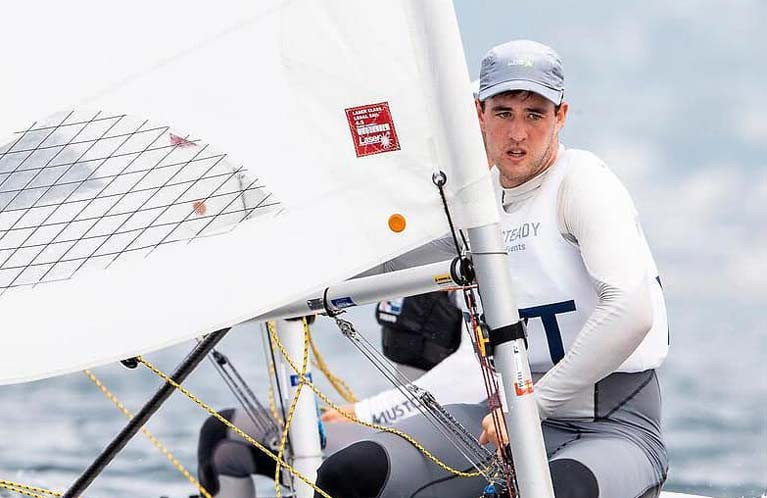Displaying items by tag: World Sailing
Ireland's Marcus Spillane is Candidate for 2020 Election of World Sailing Vice-President
USA-based Marcus Spillane is Ireland's candidate in the forthcoming election for Vice President of World Sailing.
World Sailing’s Election Committee overseeing the 2020 Election of World Sailing’s Officers has announced the Presidential and Vice-Presidential Candidates standing for election this October.
Spillane, a chartered accountant, is the Treasurer of the Olympic Steering Group of the Irish Sailing Association.
He is also International 49er Class President for the last eight years (and CEO for six years before that) is also the International Nacra 17 Class President for the last four years.
The election of the President and seven Vice-Presidents will be conducted via an electronic ballot. World Sailing Member National Authorities, in good standing with World Sailing, are eligible to vote and when casting their ballot, must select at least two male and two female candidates for Vice President.
The results of the ballot will be announced on 1 November 2020 at the General Assembly which will be held as a virtual meeting.
Eligible candidates have been endorsed by at least five World Sailing MNAs with the term of office beginning at the close of the General Assembly, at which the Board of Directors are elected for a period of four years.
Candidates eligible for election at the 2020 General Assembly, in alphabetical order by surname, are:
Presidential Candidates
Kim Andersen (DEN)
Quanhai Li (CHN)
Scott Perry (URU)
Gerardo Seeliger (ESP)
Vice-Presidential Candidates
Duriye Özlem Akdurak (TUR)
Philip Baum (RSA)
Cary Lee Byerley (ANT)
William Canfield (ISV)
Tomasz Chamera (POL)
Jan Dawson (NZL)
Luca Devoti (ITA)
Jørgen Stang Heffermehl (NOR)
Sarah Kenny (AUS)
Yann Rocherieux (FRA)
Cory Sertl (USA)
Malav Shroff (IND)
Riccardo Simoneschi (ITA)
Marcus Spillane (IRL)
Yui Shing Tong (HKG)
Voting Process
The 2020 General Assembly will be held remotely and will be conducted in line with World Sailing’s voting procedures.
The first round of voting will be held from 9-16 October 2020. This will be the main voting period for the Presidential and Vice-Presidential election.
In the event that no Presidential candidate receives more than 50% of the votes in the first round, two further rounds are scheduled for 20-23 October and 26-29 October to conduct run-off votes.
The results of the election will be announced during the General Assembly by the Election Committee on 1 November.
If there is a tie between any Vice-Presidential candidates, a run-off vote will commence on 1 November and conclude on 4 November.
Controlling and regulating the process is World Sailing’s Election Committee chaired by Philip Cotton and ably supported by Melanie Willmore and David Kellett, who have overseen the whole process so far.
In addition, KPMG have been appointed as the Independent Scrutineer.
World Sailing AGM & General Assembly Moving Online Only For 2020
World Sailing has announced it will hold its 2020 Annual General Meeting and General Assembly online only due to the global challenges caused by the coronavirus pandemic.
Abu Dhabi in the UAE had been scheduled to host World Sailing’s annual conference from 24 October, with the AGM and General Assembly concluding the meeting on 1 November.
However, due to ongoing travel restrictions, World Sailing’s board of directors have now resolved to hold the AGM and General Assembly electronically, in accordance with a written special resolution approved by its member national authorities in June.
In addition, all commission, sub-committee, committee and council meetings that would normally take place during the conference will also be hosted electronically.
Abu Dhabi will instead host the 2021 Annual Conference and AGM from 20-31 October next year
Subject to approval by World Sailing’s council, the main decision-making body of World Sailing, Abu Dhabi will instead host the 2021 Annual Conference and AGM from 20-31 October next year.
World Sailing’s election committee is now accepting nominations for the 2020 election of the World Sailing president and vice-presidents.
The deadline for the close of nominations is Sunday 6 September, eight weeks ahead of the General Assembly. A candidate must have five or more nominations to be put forward for election.
Full information on the election of the board of directors is available in Articles 73-76 of the World Sailing Constitution, with the voting system to elect detailed in Regulation 4 of the World Sailing Regulations.
The Election Committee have also produced election rules that govern the conduct of the election to ensure an atmosphere of mutual respect and equality is shown.
World Sailing, the world governing body of the sport, has received confirmation of financial support from the International Olympic Committee (IOC) following constructive dialogue.
The IOC is supporting World Sailing in addressing the challenges caused by the COVID-19 pandemic and the consequence on postponing the Tokyo 2020 Olympic Games.
In the challenging times experienced as a consequence of COVID-19, World Sailing has engaged with the IOC on how best to address the impact experienced within the sport with detailed and transparent discussions.
“Receiving the support and the encouragement from IOC President Dr. Thomas Bach means a lot for World Sailing,” commented World Sailing President, Kim Andersen. “I am looking forward to continuing the great partnership between the IOC and World Sailing with a focus on our great sport and our sailors.”
The financial support will enable World Sailing to continue plans for developing and promoting sailing worldwide and delivering the highest standards for the Tokyo 2020 and Paris 2024 Olympic Games.
World Sailing has cancelled the 2020 edition of the Youth Sailing World Championships that was scheduled to be held in Salvador, Brazil from 12 – 19 December 2020 due to the COVID-19 pandemic.
In its 50-year history, the Youth Worlds regularly attracts the best youth sailors from upwards of 60 nations. World Sailing’s Board of Directors and the Confederação Brasileira de Vela (CBVela) agreed to cancel the event in anticipation of global travel restrictions and to ensure the health and well-being of athletes, coaches, parents, officials and suppliers.
World Sailing and CBVela are now discussing the possibility of hosting the Youth Worlds in Brazil at the earliest opportunity.
The 2021 edition of the Youth Worlds will take place in The Hague, The Netherlands in July 2021.
World Sailing has appointed David Graham, a 20-year veteran in the sailing industry, as its new Chief Executive Officer starting 13 July 2020.
Graham’s extensive and impressive career includes functions in sales, events, coaching and sponsorship, including CEO and Managing Director roles.
Graham’s most recent role was at Oman Sail, a national initiative that uses the power of sport to contribute to the development of the Omani people, where he served as CEO from 2009 through to April 2020.
During his tenure, Graham was instrumental in establishing the sport in Oman, growing the national sailing team to one of the leading teams in Asia and developing the nation as a top destination for Class World Championships, America’s Cup World Series and Extreme Sailing Series events. Prior to his tenure at Oman Sail, Graham managed a sailing school before spending over a decade in senior positions in the world’s leading dinghy manufacturers.
His experience as an active sailor is equally as strong. An active sailor his whole life, he grew up as a dinghy sailor and was involved in major big boat series and races onboard both monohulls and multihulls. In addition, he has recently taken up kiteboarding to add to his repertoire of sailing skillsets.
Kim Andersen, President of World Sailing, commented, “As World Sailing looks to the future and the next phase of growth, we are confident that with David’s combined background in management and sailing that he is the right leader to help restructure and provide a strong direction for the operations of our organisation. On behalf of the entire World Sailing family it gives me great pleasure to welcome David to the team.”
World Sailing’s Board of Directors worked with Odgers Berndtson in search of the ideal candidate and reviewed a strong list of international candidates.
Scott Perry, World Sailing Vice President, added, “The board received several high calibre applicants and having reviewed each one carefully we unanimously approved the selection of David Graham. With better clarity over our finances through to 2021, now is the time to build up our future and this includes bringing in a CEO to guide the day to day operations and future negotiations of our organisation.”
On his appointment, Graham commented, “I am really looking forward to my new role with World Sailing. I would like to thank President Kim Andersen and the board for their confidence; I look forward to working with them to develop World Sailing and building a strong organisation together.”
World Sailing president Kim Andersen has announced the immediate furloughing of almost all World Sailing staff for at least three weeks “to ensure the long-term financial viability” of the organisation.
In addition, higher paid staff are being requested to take a 20% pay cut until the end of the year.
In a statement released yesterday evening (Tuesday 14 April), Andersen confirmed that the board of World Sailing — whose staff are employed through a UK-based company — is taking advantage of financial supports made available by the UK Government to support salary costs during the Covid-19 pandemic.
From today, Wednesday 15 April, until Wednesday 6 May, almost all staff are on “furlough leave” and will not be permitted to engage in any work for World Sailing. Up to 80% of their salaries will be funded by the UK Government, with the difference covered by World Sailing.
“After 6 May, the board will review the position with the senior management team and decide whether furlough leave is extended or whether staff will return to work,” Andersen said.
“I must emphasise to all World Sailing Members, volunteers and stakeholders that it is a legal condition that staff cannot work for World Sailing whilst on furlough leave.
“Therefore, no emails, calls or correspondence will be responded to from the staff and nor should you expect any reply.
“I understand this will be difficult for a number of areas of World Sailing, but we must respect the conditions of this scheme.”
Andersen confirmed that a small number of senior managers will not be on furlough and will be on hand to respond to genuinely urgent matters.
In addition, Andersen said, the World Sailing board “has requested that World Sailing staff earning more than a certain amount take a 20% pay reduction until the end of the year (or earlier if possible)”.
“This requires the individual agreement of the staff and we have been consulting with the staff on the viability of this proposal,” he said.
Anderson added: “Overall, the board continues to have frequent discussions with our partners concerning the impact of the postponement of the Olympic Games in order to ensure our financial health is as stable as possible.”
Over the weekend, Andersen responded to media criticism over reports of financial difficulties within World Sailing arising from the 12-month postponement of the Tokyo 2020 Olympic Games.
World Sailing President Kim Andersen Responds to Media Criticism
World Sailing President Kim Anderson has responded to criticisms of the world governing body for the sport of sailing after financial difficulties arose with the postponement of the Tokyo Olympics.
Below is an interview by Mikkel Thommessen of Seilmagasinet.no, where Andersen outlines the steps being taken at the Federation.
As Afloat reported previously, and referenced in the interview below (starting at 3 minutes on the timeline) three issues are affected: the renegotiation of the lease in London, reduction in wage costs, and the possibility of a partial payment of the income from the IOC which, after the Olympic postponement, is only due in September 2021.
World Sailing Needs to Act Now To Restore a Viable Federation
The news that World Sailing is facing financial difficulties comes as no shock to member National Authorities (MNAs) who watched in horror as an office move from Southampton to London created a financial and human resources nightmare in one fell swoop.
Cash and people haemorrhaged from the organisation leaving World Sailing depending on a bailout from the IOC, as the MNAs are unlikely to be in a position to assist in these COVID-ravaged times, they themselves desperately trying to stave off financial ruin.
While publicly they will hesitate from saying “I told you so”, privately the influential MNAs will be asking serious questions of the World Sailing Board and looking for immediate effective action to start the road to recovery.
The first step will be to move the office out of London to the lowest cost location with reasonable access to a hub airport. Office parks within easy reach of Heathrow currently rent at about one fifth that of central London.
"World Sailing’s current office is a personal vanity project that needs to be ended asap"
A modern International Federation’s offices do not need to be a showcase. World Sailing’s current office is a personal vanity project that needs to be ended asap.
Staff costs, excluding CEO, at World sailing increased from £1.19m in 2014 to £1.9m in 2018. World Sailing must cut back to the minimum necessary to maintain Olympic status, a job that is made easier by the lack of activity due to the current crisis.
World Sailing has suffered from a lack of quality leadership since 2015, with obvious impacts on staff morale and financial probity. A Chief Executive who has organisational ambitions rather than personal aggrandisement is now vital to restore World Sailing to a viable functioning federation, focussed on serving its members. In addition to the actions above, his/her first steps should be to establish a relationship with the MNAs and Class Associations, something that did not happen under previous CEOs.
World Sailing must act now and act decisively if a total collapse is to be avoided.
World Sailing Claimed To Be In Dire Financial Straits In Wake Of Olympics Postponement
A vice-president of World Sailing has appealed for the International Olympic Committee (IOC) to advance its share of revenue from Tokyo 2020 as the governing body faces dire financial straits.
Scott Perry told insidethegames that the postponement of the next Olympic Games from this summer to next year, amid the Covid-19 pandemic that has seen events cancelled the world over, has worsened an already precarious funding situation.
World Sailing had been expecting a payout in the region of €12 million from the Tokyo games dividend, which would have filled a predicted hole in its accounts this year.
“The state of World Sailing’s finances were challenged before the Covid-19 crisis and the subsequent postponement of the Olympics,” Perry said.
“The postponement of the Olympics has made our financial challenges much more acute.
“Along with most International Federations we would dearly like an advance from the IOC but at this stage we don’t have any indication that an advance will be forthcoming.”
Insidethegames has more on the story HERE.
All Eyes on Genoa World Sailing Cup as Italy Suspends Sailing Regattas Until April 3rd
All eyes are on the Italian port of Genoa as it prepares to host the important Olympic classes qualifier at the World Cup of Sailing event next month while Italy goes into a period of lockdown over Coronavirus.
This is a problem for top-level competitors from 59 nations either trying to qualify for their national team (like Ireland) or to maintain their competitive edge before the 2020 Games.
As Afloat reported yesterday, the Italian Sailing Federation has suspended all events and competitions on a national basis until April 3rd, just a week before the 1,000-competitor Genoa World Cup event gets underway.
Other international sailing fixtures scheduled for Italy in April have already been scrubbed such as the J24 Europeans Championships.
Irish Sailing’s performance squad has cancelled its planned training base in the northern Italian city and switched to Mallorca in the Balearic Islands instead but even now that might not be enough to stem the virus threat.
"If cancelled, how will the remaining European places for Tokyo 2020 be decided?"
The scheduled Genoa regatta is the final European qualification opportunity for the men’s single-handed and skiff events ahead of Tokyo 2020 and Ireland is desperately seeking those final places in both classes.
The Asian Olympic qualifier has already been switched to Genoa due to Covid-19 concerns but with that potentially affected too the question on everyone's lips is: if cancelled, how will the remaining European places for Tokyo be decided?
And with the latest spread of the virus, it now looks like other early Summer Olympic sailing regattas will be affected too, the most affected being International championships leading up to the Tokyo 2020 Olympic Games at the end of July.
These potentially include:
- 470 World Championships, Palma, Mallorca, 13 March
- Olympic Classes Princess Sofia Regatta, Palma, Mallorca, 27 March
- Olympic Classes Hempel World Cup Series, Genoa, Italy, 12 April
- America's Cup – ACWS Round 1, Cagliari, Italy, 18 April
- 470 European Championships, Hyeres, France, 5 May
- Finn Gold Cup, Palma, Mallorca, 8 May
- RS:X European Championship, Athens, Greece, 10 May
- Nacra 17, 49er, 49erFX European Championships, Malcesine, Italy, 11 May.
World Sailing says it is keeping the situation under constant review while a group of sailors have launched an online petition in the hopes of persuading World Sailing to cancel the upcoming World Cup Series event in Genoa.
The petition states: "It is irresponsible and possibly dangerous to host the Hempel Sailing World Cup in Genoa due to the risks of COVID-19. Having hundreds of sailors, coaches and staff from all over the world stay in Northern Italy and return to their home countries would undue global efforts to contain the virus. It is the responsibility of World Sailing to provide safe events for their competitors".
One of the Irish sailors seeking the last 49er berth is Ryan Seaton from Belfast. He told BBC NI news this week about travelling to Genoa: "The experts have been keeping us up-to-date and if they say it's safe to go we will trust their opinion. If they say it's a no-go they'll have to to look at an alternative location to get the qualifier in."




























